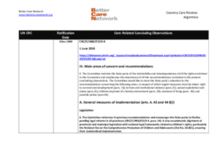This page contains documents and other resources related to children's care in the Americas. Browse resources by region, country, or category.
Displaying 1791 - 1800 of 3116
"A practice of tearing children apart from their parents to keep other immigrants from coming is abusive and completely indefensible," writes Human Rights Watch in regards to the U.S. policy of separating families who arrive from the U.S. - Mexico border.
This study had two purposes; first to examine mental health disparities among LGBTQ youth and their heterosexual peers who are involved in the child welfare system, and second to observe the effectiveness of systems of care with youth in child welfare and if any differences exist between LGBTQ youth and heterosexual youth.
This country care review includes the care-related Concluding Observations adopted by the Committee on the Rights of the Child and the Committee on the Rights of Persons with Disabilities.
To understand what states are doing, the U.S. Juvenile Law Center created the National Extended Foster Care Review.
Qualitative data from a mixed‐methods study were used to explore the phenomenon of complex trauma in 20 urban‐dwelling mothers using a combined interpretive phenomenological and directed content analysis.
This paper discusses the struggles of young women who are “crossover youth.” Crossover youth are children who are simultaneously involved in the foster care and juvenile justice systems.
In this opinion piece for CBC News, Elizabeth Wall-Wieler discusses findings from a recent study which "followed the children of 5,942 teenage mothers in Manitoba up to their second birthday to see how many were placed into care."
This paper provides an illustrative case involving the development and testing of models used to predict the probability of whether U.S. foster children would achieve legal permanency.
This article from the Washington Post describes the impacts of the new US policy "in which families arriving at the border would be forcibly broken up, with children and parents separated from one another and detained separately."
The investigators specifically queried the phenomenon of seeking healthcare services after foster care drawing from the Phenomenology of Practice approach.


